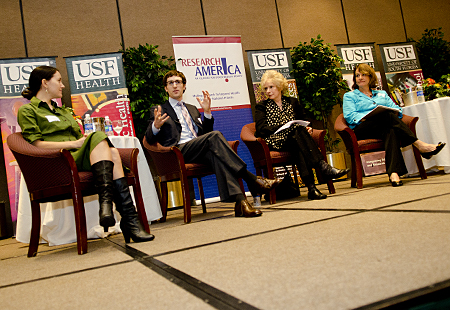Scientists and journalists seek to educate public
Scientists speak to each other in complexities, while journalists seek to tell stories simply.
Yet the two need to find common ground to help the public understand scientific and medical topics accurately –especially in a world in which science often becomes politicized and scientific funding can depend on public perceptions.
The two groups came together last week at USF to try to find common understandings at a forum at USF, convened by Research! America, USF and Pfizer.
“There’s a growing recognition that scientists need to take the lead in communicating our research findings,” said Jay Dean, PhD, USF professor in Molecular Pharmacology & Physiology. “We need to educate the public.”
But with the journalism industry trying to chart a new course in a wired world, telling science stories accurately can become difficult. Stories about such topics as global climate change and vaccine safety lose accuracy and become overly politicized, often giving too much scientific weight to a small minority of zealots.
“It’s the best of times and the worst of times” for explaining science to the public, said Claudia Dreifus, a science reporter for the New York Times. “The benefits of science and technology are increasingly apparent.”

The science journalism panel included representatives from the New York Times, St. Petersburg Times, Nature Medicine and Bloomberg View.
Witness, for example, the global outpouring in reaction to the death of Steve Jobs, she noted. People across the world understood how this technological innovator transformed the world.
And yet, as journalists are laid off and newsrooms shrink across the country, it’s becoming harder and harder to tell these complex and nuanced stories.
“The bad news is that science sections are disappearing from newspapers,” Dreifus added.
Even the internet has two sides for disseminating scientific information. It makes that information more broadly available than it ever has been – but it also spreads a huge amount of inaccurate information, and makes it hard for web surfers to separate good information from bad.
“Any nutty thing has the same weight as the next,” Dreifus said.
Scientist and journalist Sheril Kirshenbaum sees the same problem: people can find a source somewhere on line to say that just about anything is true.
“You can shop for your science information the same as you can shop for your holiday presents,” she said.

Charlotte Sutton (left), health and medicine editor at the St. Petersburg Times, responds to a question by moderator Irene Maher, a Times health writer whose career in media and broadcasting spans nearly 30 years.
Kirshenbaum is a research scientist with the Webber Energy Group at the University of Texas at Austin, as well as writing the science column for Bloomberg View, serving as a science advisor to NPR’s Science Friday and writing books and for other publications.
At the end of the day, both scientists and journalists need to remember that the public believes in the importance of scientific research and want to be more informed, said Mary Woolley, president and CEO of Research!America. Sixty percent of Floridians would like to see more information in the news about science and research, according to a poll commissioned by Research!America and released in conjunction with the forum.
An overwhelming majority of Floridians, 87 percent, believe Florida needs to be a leader in science and medical research. Almost as many – 80 percent – say spending money on scientific research will help create jobs and boost incomes in the state.
– Story by Lisa Greene, photos by Eric Younghans, USF Health Communications

